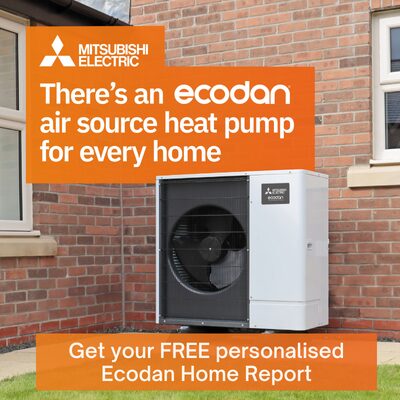What impact does compressor not running at low LWT have?
Helllo everyone, I'm new to the forum as we've just had a 6kW Daikin Altherma 3 Monobloc R32 ASHP installed by Octopus Energy in the last fortnight, replacing a gas boiler for DHW and CHW to radiators (all our radiators were replaced with doubles during the install).
It's been an interesting couple of weeks finding more and more information about ASHP on this forum and places like the Heat Geek YT channel. I've followed the advice to use weather dependent control, and to set an appropriate WD curve in our system, and it is keeping the house at a consistent 20C, which is perfect for us. Though clearly it is relatively mild right now, so I haven't been able to see if the curve is good for colder temps (ASHP geekery is making me want temperatures to go back to sub-zero so I can experiment some more, guess I'll just have to wait for next winter now!)
Early on we found that evening temperatures were a bit too warm for us, even with quite extreme setback values (which I understand is not best practice). The system had been commissioned with minimum LWT of 25C, I 've adjusted this setting to allow minimum LWT of 20C and since then our evenings have been more pleasent, with a setback of just -3C. In this video from Heat Geek (in what looks to be the Daikin training centre), he's going through the settings of the Altherma monobloc system and notes that the ASHP will disable the compressor at LWT below 25C and I've confirmed that is the case from the controller itself when our LWTs are below 25C.
My question to you knowledgeable folk is this; what is the impact of the ASHP disabling the compressor at the low LWTs that I've set?
Hello and welcome to the forum! It's great to hear that you've recently had a Daikin Altherma 3 Monobloc R32 ASHP installed and that you've been finding the information on this forum.
Regarding your question about the impact of the ASHP disabling the compressor at low LWTs, it's important to note that the compressor is the component of the ASHP that consumes the most energy. When the LWT falls below a certain threshold, the ASHP will disable the compressor to prevent it from running inefficiently and consuming more energy than necessary. In your case, since you've adjusted the minimum LWT setting to allow for a lower temperature, the ASHP will disable the compressor when the LWT falls below 20C instead of the default setting of 25C.
The impact of the ASHP disabling the compressor at low LWTs will depend on the temperature outside and how well-insulated your home is. If the outside temperature is mild and your home is well-insulated, the ASHP may be able to maintain a comfortable indoor temperature without the compressor running at all. However, if the outside temperature is very cold and/or your home is poorly insulated, the ASHP may struggle to maintain a comfortable indoor temperature without the compressor running, and you may experience reduced heating performance or even cold spots.
It's great that you've been experimenting with different settings to find what works best for your home and your preferences. If you do experience any issues with heating performance or comfort, you may want to consider adjusting the minimum LWT setting back to the default value of 25C.
Get a copy of The Ultimate Guide to Heat Pumps
Subscribe and follow our YouTube channel!
Welcome @mortstar. 🙂 Compressors are very well protected in ASHPs, and user and installer configurable setting adjustments to the water side controls won't have adverse impact. But if you think about the physics of it, setting the minimum leaving temperature to be 20degC when you want the house at 20degC isn't logical. You're consuming energy via the circulating pump motor to pump water round a system that's not conveying any energy for either heating or cooling. That's probably why the OEM default setting is 25degC, a few degrees above the comfort temperature most people want their homes. The compressor might de-energise on minimum turn down anyway. Compressors tend to modulate down to about 25% minimum output. For heating loads lower than minimum turn down, they'll start to cycle the compressor on and off. That's why oversizing ASHPs isn't a good idea. Most ASHPs will run at part or low output in a typical heating season, only getting near full 'nameplate' output when heating a house from cold, or providing hot water generation.
The input power consumed by a compressor is the energy required to compress refrigerant gas from a low to a high pressure. The bigger the pressure increase, the more power is required. The evaporating pressure and temperature determines the low side pressure, and the condensing pressure and temperature determines the high side pressure. The evaporator temperature has to be lower than the outdoor air temperature in order to capture heat energy from outside, and the condensing temperature has to be higher than the leaving water temperature in order to transfer that heat energy into the heating system water. The greater the difference, the greater the power consumed. ASHP power consumption increases significantly in colder weather, but that's just physics - outside it's cold, but the house needs warmer water to provide sufficient heating. Running costs go up massively in the colder October-March months, which alarms people new to ASHP who have not run their system through a winter season. That said, you get very good efficiencies at other times & seasons so, over a year, you realise a net saving in energy bills. You're consuming massively less energy as a household too 🙂
- 27 Forums
- 2,495 Topics
- 57.8 K Posts
- 442 Online
- 6,220 Members
Join Us!
Worth Watching
Latest Posts
-
RE: What determines the SOC of a battery?
@batpred Ironically you didn't have anything good to...
By Bash , 4 minutes ago
-
RE: Testing new controls/monitoring for Midea Clone ASHP
Here’s a current graph showing a bit more info. The set...
By benson , 18 minutes ago
-
RE: Setback savings - fact or fiction?
True there is a variation but importantly it's understa...
By RobS , 18 minutes ago
-

Below is a better quality image. Does that contain all ...
By trebor12345 , 45 minutes ago
-
Sorry to bounce your thread. To put to bed some concern...
By L8Again , 47 minutes ago
-

@painter26 — they (the analogue gauges) are subtly diff...
By cathodeRay , 1 hour ago
-

RE: Electricity price predictions
I am always impressed with how you keep abreast of so m...
By Batpred , 2 hours ago
-
RE: Humidity, or lack thereof... is my heat pump making rooms drier?
@majordennisbloodnok I’m glad I posted this. There see...
By AndrewJ , 2 hours ago
-
Our Experience installing a heat pump into a Grade 2 Listed stone house
First want to thank everybody who has contributed to th...
By Travellingwave , 5 hours ago
-

RE: Solis inverters S6-EH1P: pros and cons and battery options
Just to wrap this up here for future readers: The S...
By Batpred , 8 hours ago
-
RE: Struggling to get CoP above 3 with 6 kw Ecodan ASHP
Welcome to the forums.I assume that you're getting the ...
By Sheriff Fatman , 8 hours ago
-
RE: Say hello and introduce yourself
@editor @kev1964-irl This discussion might be best had ...
By GC61 , 9 hours ago
-

RE: Oversized 10.5kW Grant Aerona Heat Pump on Microbore Pipes and Undersized Rads
@uknick TBH if I were taking the floor up ...
By JamesPa , 24 hours ago
-

RE: Getting ready for export with a BESS
I would have not got it if it was that tight
By Batpred , 1 day ago
-
RE: Need help maximising COP of 3.5kW Valiant Aerotherm heat pump
@judith thanks Judith. Confirmation appreciated. The ...
By DavidB , 1 day ago
-

RE: Recommended home battery inverters + regulatory matters - help requested
That makes sense. I thought better to comment in this t...
By Batpred , 1 day ago
-
Bosch CS5800i 7kW replacing Greenstar Junior 28i
My heat pump journey began a couple of years ago when I...
By Slartibartfast , 1 day ago
-

RE: How to control DHW with Honeywell EvoHome on Trianco ActiveAir 5 kW ASHP
The last photo is defrost for sure (or cooling, but pre...
By JamesPa , 1 day ago
-

RE: Plug and play solar. Thoughts?
Essentially, this just needed legislation. In Germany t...
By Batpred , 1 day ago
-
RE: A Smarter Smart Controller from Homely?
@toodles Intentional opening of any warranty “can of wo...
By Papahuhu , 1 day ago
-
RE: Safety update; RCBOs supplying inverters or storage batteries
Thanks @transparent Thankyou for your advic...
By Bash , 1 day ago
-
RE: Air source heat pump roll call – what heat pump brand and model do you have?
Forum Handle: Odd_LionManufacturer: SamsungModel: Samsu...
By Odd_Lion , 1 day ago
-
RE: Configuring third party dongle for Ecodan local control
Well, it was mentioned before in the early pos...
By F1p , 2 days ago




